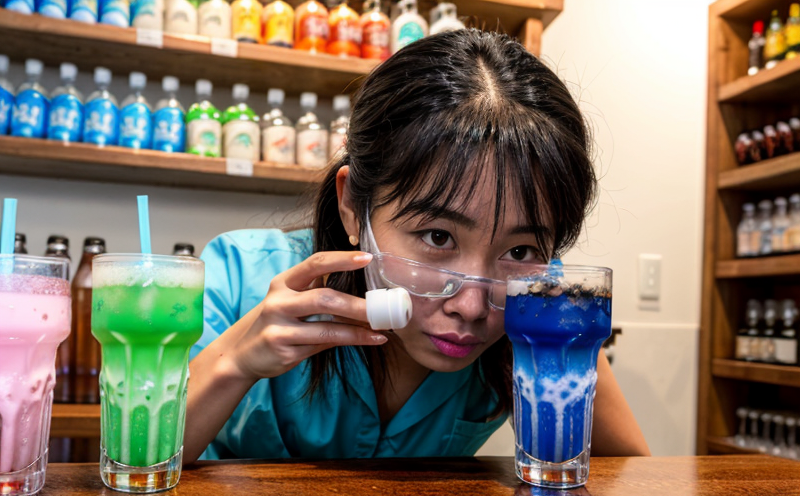ISO 21527-1 Yeasts and Moulds Enumeration in Beverage Products
The enumeration of yeasts and moulds is a critical aspect of beverage microbiology testing, ensuring product quality and safety. ISO 21527-1 provides the methods for enumerating yeasts and moulds in beverages by using culture-based techniques. This standard ensures that laboratories conducting these tests adhere to internationally recognized protocols.
Understanding the microbial content is essential for several reasons. Yeasts and moulds can significantly affect the sensory attributes of beverages, such as taste, aroma, and color. They also play a crucial role in fermentation processes, which are vital for certain types of beverages like beers, wines, and spirits. The presence of these microorganisms must be controlled to meet regulatory standards and consumer expectations.
The testing process involves several steps. Initially, samples from the beverage products are collected under sterile conditions. These samples are then inoculated onto selective media suitable for yeasts and moulds growth. Incubation periods vary depending on the specific strains of microorganisms being tested. After incubation, colonies are counted using a colony-forming unit (CFU) method.
The standard specifies the use of ISO 11299-3 for the enumeration of yeasts and moulds in beverages. This ensures that laboratories follow consistent procedures which are validated by international standards, enhancing reliability and comparability across different testing facilities.
In addition to the microbiological aspects, it is important to consider the impact of these microorganisms on the shelf life and safety of the beverage products. Proper enumeration helps manufacturers understand their product's microbial load, allowing for effective quality control measures. This is particularly critical in ensuring that the final product meets both regulatory requirements and consumer health and safety standards.
The importance of this testing cannot be overstated, especially given the increasing scrutiny on food safety and quality by consumers and regulatory bodies worldwide. By adhering to ISO 21527-1, laboratories can provide accurate and reliable data that informs decision-making processes in beverage production, ensuring consistency and compliance.
Understanding the microbial dynamics within beverages also aids in developing strategies for improving product quality and extending shelf life through better process control. This includes optimizing fermentation conditions or identifying potential sources of contamination early on.
Benefits
Ensures consistent and reliable results compliant with international standards.
Provides actionable insights into product quality and safety, facilitating informed decision-making.
Supports regulatory compliance and enhances consumer trust through accurate microbial enumeration.
Why It Matters
The importance of yeast and mold testing in beverages cannot be overstated. These microorganisms significantly influence the sensory attributes, stability, and safety of beverages. Yeasts are responsible for fermentation processes that give rise to various alcoholic beverages like beers and wines. Molds can contribute to spoilage and off-flavors if not controlled properly.
From a regulatory standpoint, accurate enumeration of these microorganisms is essential to comply with national and international standards such as ISO 21527-1. Failure to adhere to these guidelines can lead to product recalls, reputational damage, and potential legal ramifications for manufacturers.
Avoiding contamination during sample collection and processing is critical in maintaining the integrity of the test results. Proper aseptic techniques must be employed throughout the sampling process to prevent cross-contamination between different beverage types or batches. This ensures that each sample accurately represents its respective product, providing reliable data for analysis.
The impact of these tests extends beyond mere compliance; they play a crucial role in enhancing overall product quality and safety. Understanding the microbial composition helps manufacturers implement targeted interventions aimed at reducing contamination risks while maintaining desirable characteristics like flavor profile or carbonation levels.
Benefits
- Ensures consistent and reliable results compliant with international standards.
- Provides actionable insights into product quality and safety, facilitating informed decision-making.
- Supports regulatory compliance and enhances consumer trust through accurate microbial enumeration.
The benefits of adhering to ISO 21527-1 are manifold. Firstly, it guarantees that the testing methods used are consistent with globally recognized guidelines, ensuring accuracy and reproducibility across different laboratories worldwide. This consistency is crucial for maintaining high standards in the beverage industry where reliability is paramount.
Secondly, by providing detailed information on microbial presence and levels within beverages, this standard enables manufacturers to make informed decisions regarding production processes. It helps identify potential areas of improvement or risks that need addressing, thereby enhancing overall product quality and safety.
Thirdly, compliance with ISO 21527-1 fosters trust among consumers who increasingly demand transparency about the ingredients and manufacturing practices used in their food and drink products. This not only boosts brand reputation but also contributes to long-term customer loyalty.
Eurolab Advantages
At Eurolab, our expertise in biological and microbiological testing is unparalleled. Our team of skilled professionals ensures that every aspect of the ISO 21527-1 yeast and mold enumeration process adheres strictly to international standards. We employ advanced instrumentation and techniques that enhance accuracy and precision.
We offer comprehensive training programs for clients interested in learning more about best practices related to this type of testing. Our experienced staff can assist in interpreting results, providing actionable recommendations based on the findings. Additionally, we provide detailed reports that include all relevant data points necessary for informed decision-making.
Our commitment to excellence extends beyond just executing tests; it includes ensuring timely delivery and maintaining strict confidentiality protocols regarding proprietary information shared by clients during testing procedures.





